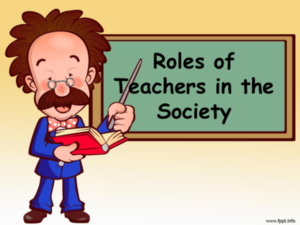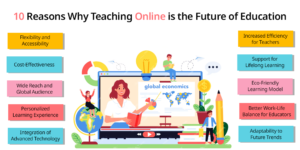Table of Contents
World Teachers Day 2025: Honoring Educators and Shaping the Future of Education
Introduction of World Teachers Day
 Every year, on October 5th, the world comes together to celebrate World Teachers Day, an occasion to recognize and honor the incredible contributions teachers make to our societies. World Teachers’ Day acknowledges the dedication, influence and hard work of educators around the globe, as they shape the minds and futures of generations to come.
Every year, on October 5th, the world comes together to celebrate World Teachers Day, an occasion to recognize and honor the incredible contributions teachers make to our societies. World Teachers’ Day acknowledges the dedication, influence and hard work of educators around the globe, as they shape the minds and futures of generations to come.
In 2025, World Teachers’ Day will continue to emphasize the critical role teachers play in creating innovative learning environments, empowering students, and fostering lifelong learning. World Teachers’ Day to reflect on the value of education, the challenges teachers face, and the need to ensure that all teachers are supported, respected and given the tools they need to succeed.
The Significance of World Teachers Day
World Teachers’ Day was established by the United Nations Educational, Scientific, and Cultural Organization (UNESCO) in 1994 to commemorate the signing of the Recommendation concerning the Status of Teachers in 1966. This document outlined the rights and responsibilities of teachers and set standards for their training, recruitment and working conditions.
The celebration of World Teachers’ Day serves as a reminder that teachers are at the heart of education. They play a pivotal role in fostering intellectual growth, emotional development, and social progress. Teachers are not just transmitters of knowledge; they also shape students’ values, aspirations, and dreams.
The Role of Teachers in Shaping Society
 1. Fostering Knowledge and Critical Thinking:
1. Fostering Knowledge and Critical Thinking:
Teachers are the foundation of knowledge in any society. They not only impart essential academic skills but also encourage critical thinking, creativity and problem-solving. Through classroom discussions, debates and interactive learning, teachers challenge students to explore ideas, ask questions and develop a deeper understanding of the world around them.
2. Mentorship and Personal Growth:
Beyond academics, teachers serve as mentors who help guide their students through the complexities of life. They provide support during challenging times, offer guidance for personal development, and inspire students to become responsible, empathetic citizens. By fostering an environment of trust and respect, teachers have the power to shape students’ values, attitudes, and life goals.
3. Building Future Leaders:
Education is a powerful tool for societal transformation, and teachers are the architects of change. By equipping students with knowledge and life skills, teachers prepare the next generation of leaders, innovators, and problem-solvers who will tackle the global challenges of tomorrow. A well-educated generation is essential for driving economic progress, social justice, and sustainable development.
Challenges Faced by Teachers Today
While teachers play an indispensable role in society, they face a range of challenges that can hinder their ability to provide the best education possible. Some of these challenges include:
-
Lack of Resources: Many teachers work in underfunded schools that lack essential materials, technology, and infrastructure. This makes it difficult for educators to deliver high-quality education and support students effectively.
-
Heavy Workloads: Teachers are often tasked with large class sizes, administrative duties, and extracurricular responsibilities, which can lead to burnout and stress. Ensuring teachers have a manageable workload is essential to maintaining their effectiveness and well-being.
-
Low Salaries: In many parts of the world, teachers are underpaid compared to other professionals with similar levels of education. Fair compensation is essential to attracting and retaining talented educators who are passionate about teaching.
-
Mental Health and Well-being: The emotional toll of teaching, particularly in challenging environments, can impact teachers’ mental health. Providing adequate support, professional development, and work-life balance is essential for teachers’ longevity in the profession.
How to Celebrate World Teachers Day 2025
 1.Show Appreciation to Your Teachers: Take the time to thank and acknowledge the teachers who have made an impact on your life. Whether through a thank-you note, flowers, or a simple gesture of gratitude, expressing your appreciation can make teachers feel valued and respected.
1.Show Appreciation to Your Teachers: Take the time to thank and acknowledge the teachers who have made an impact on your life. Whether through a thank-you note, flowers, or a simple gesture of gratitude, expressing your appreciation can make teachers feel valued and respected.
2.Support Teacher Advocacy: Use World Teachers’ Day as an opportunity to advocate for better conditions for educators. This can include supporting higher wages, better resources, training opportunities, and mental health support for teachers.
3.Celebrate Teacher Achievements: Highlight the achievements and contributions of teachers in your community. Schools, universities, and local organizations can host events such as awards ceremonies, teacher appreciation lunches, or social media campaigns to recognize outstanding educators.
4.Get Involved in Education Initiatives: Volunteer in local schools, donate to educational programs, or participate in initiatives that support teacher training, classroom resources, and school infrastructure. Giving back can help improve the overall teaching environment.
The Future of Education and Teachers

The future of education and the role of teachers are evolving rapidly due to technological advancements, changes in societal needs and shifting educational paradigms. As education systems adapt to the demands of the 21st century, teachers will face new opportunities and challenges in shaping the minds of tomorrow. Here are some key aspects and predictions for the future of education and the evolving role of teachers:
1. Technology-Enhanced Teaching
- Blended Learning: The future of education will likely combine traditional in-person teaching with digital platforms, allowing for more flexible and personalized learning experiences. Teachers will facilitate both online and face-to-face learning, supporting students in different environments.
- AI and Personalized Learning: Artificial Intelligence (AI) will enable personalized learning experiences for students. AI can analyze student data to identify strengths and weaknesses and create tailored learning paths. Teachers will use AI tools to offer individualized support and adjust their teaching methods accordingly.
- Augmented and Virtual Reality (AR/VR): Teachers will use AR/VR to create immersive learning environments. For example, students could virtually visit historical sites, perform complex scientific experiments, or explore deep-sea ecosystems. These technologies will make learning more interactive and engaging, allowing teachers to facilitate real-world experiences.
2. Student-Centered Education
- Personalized Learning Paths: In the future, education will become more individualized, with students taking more control of their learning journeys. Teachers will act as facilitators, guiding students through personalized curricula that cater to their interests, strengths, and learning styles.
- Competency-Based Education (CBE): CBE focuses on students mastering specific skills and concepts at their own pace. Teachers will assess students based on their proficiency rather than the time spent in class. This allows students to progress when they demonstrate mastery, ensuring they gain a deeper understanding of the material.
- Flexible Classrooms: Classrooms may become more flexible and adaptable to different learning styles and needs. Teachers will use technology to support project-based learning, collaboration, and independent study. Flexible spaces, with movable furniture and creative layouts, will enable students to work in various configurations, fostering creativity and teamwork.
3. Teacher as a Facilitator and Mentor
- Shift from Traditional Instruction to Facilitation: Teachers will move from being the sole authority on knowledge delivery to becoming facilitators of learning. Instead of simply lecturing, they will guide students through critical thinking, problem-solving, and collaborative projects. Teachers will encourage independent research and inquiry-based learning.
- Mentorship and Social-Emotional Support: Teachers will increasingly take on the role of mentors, providing emotional and social support to students. As the focus shifts to holistic development, teachers will help students build resilience, manage stress, and develop emotional intelligence. This will require teachers to receive training in social-emotional learning (SEL) and mental health awareness.
- Collaboration with Students: Teachers will collaborate more with students to set learning goals and determine the best methods for achieving them. This participatory approach empowers students to take ownership of their education while allowing teachers to better understand their needs and motivations.
4. Lifelong Learning and Continuous Professional Development
- Ongoing Learning for Teachers: Teachers will need to engage in continuous professional development to keep up with new teaching methods, technological tools, and changing educational standards. Lifelong learning will become essential for educators to stay relevant and effective in an ever-evolving educational landscape.
- Collaboration and Sharing Best Practices: Teachers will increasingly collaborate with peers around the world, sharing best practices, lesson plans, and resources. This collaboration will be supported by online platforms, enabling teachers to learn from one another and adopt innovative strategies.
- Micro-Credentials and Digital Badges: Instead of relying on traditional degrees, teachers may earn micro-credentials or digital badges for specific skills or achievements, such as mastering a new technology, teaching method, or subject area. These credentials can be stacked over time to demonstrate professional growth.
5. Global Classrooms and Cultural Exchange
- Global Learning Communities: The rise of digital learning platforms will make it easier for students and teachers to connect with peers from around the world. Teachers will create global classrooms where students from different countries collaborate on projects, exchange ideas, and develop cross-cultural understanding.
- Promoting Global Citizenship: Teachers will help students understand their role as global citizens, addressing issues such as climate change, human rights, and international cooperation. Lessons will be more globally focused, with an emphasis on understanding different cultures and perspectives.
- Language and Communication Skills: As students become part of a global learning community, teachers will emphasize the development of strong communication skills, including proficiency in multiple languages. Teachers will use technology to bridge language barriers and create inclusive learning environments for diverse groups of students.
6. Data-Driven Decision Making
- Learning Analytics: Teachers will increasingly use data-driven tools to track student progress and identify areas of improvement. Learning analytics will provide insights into students’ strengths, weaknesses, and engagement levels, enabling teachers to make informed decisions about how to adapt their teaching.
- Predictive Analytics: Teachers may use predictive models to anticipate students’ academic needs and provide proactive interventions. For example, AI tools could analyze trends in students’ performance and suggest resources or personalized activities to help them succeed.
- Real-Time Feedback: With the help of technology, teachers will be able to provide real-time feedback to students. This allows students to make immediate adjustments and improve their work, enhancing the learning process.
7. Focus on Soft Skills and Critical Thinking
- Developing Critical Thinking: As automation and AI take over more routine tasks, human skills like creativity, critical thinking, and problem-solving will become increasingly valuable. Teachers will focus on developing these higher-order thinking skills, encouraging students to analyze information, think critically, and generate innovative solutions to complex problems.
- Emphasizing Collaboration and Communication: Future education will prioritize collaboration, teamwork, and effective communication. Teachers will help students work together, whether in person or online, to solve problems, share ideas, and learn from one another.
- Creative and Entrepreneurial Skills: Teachers will foster creativity and entrepreneurial thinking, encouraging students to explore new ideas, take risks, and build solutions for real-world challenges. This could be achieved through project-based learning, design thinking, and other experiential learning methods.
8. Inclusion and Equity in Education
- Personalized Support for Diverse Learners: Teachers will provide more personalized and inclusive education for students with varying needs, including those with disabilities or learning difficulties. Technologies such as speech-to-text, adaptive learning software, and virtual assistive tools will support teachers in catering to diverse learners.
- Global Equity: Teachers will work toward closing the gap in education, ensuring that all students, regardless of socioeconomic background or geographic location, have access to high-quality learning experiences. This will require collaboration with governments, NGOs, and tech companies to provide resources and training to underserved communities.
- Culturally Responsive Teaching: Teachers will become more culturally responsive, acknowledging and celebrating students’ diverse backgrounds. This approach will help create inclusive classrooms where all students feel valued and respected.
9. Reimagining the Role of Educational Institutions
- Flexible Learning Spaces: Schools and universities will no longer be rigid, traditional institutions. The physical and virtual classroom boundaries will blur as education becomes more decentralized and modular. Teachers will facilitate learning in various environments, including community spaces, online platforms, and even at home.
- Collaborative Models of Education: Teachers will work in teams with other educators, administrators, and community organizations to create holistic, interdisciplinary learning experiences. Schools may evolve into hubs of innovation, collaboration, and skill development.
Conclusion
World Teachers Day 2025 is an opportunity to celebrate the immense value that teachers bring to our lives and the world. By acknowledging their contributions, addressing their challenges, and supporting their growth, we can ensure that teachers are empowered to continue shaping the future of education. Teachers do more than teach—they inspire, empower, and transform lives. Let us take this day to express our gratitude, advocate for their well-being, and commit to ensuring that quality education is accessible to all.
